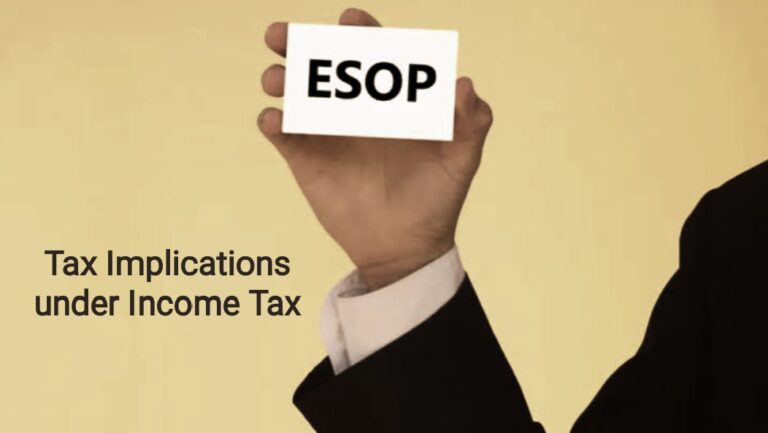As per the amendments under budget 2020 from FY 2020-21 onwards, when an employee receives ESOPs from an eligible startup, they need not pay tax in the year of exercising the option.
Employee Stock Option Plans (ESOPs) are a fantastic way for companies to reward and motivate their employees. They provide employees with the opportunity to purchase company stocks at a discounted price, fostering a sense of ownership and alignment with the company’s success.
ESOPs offer a win-win situation for both the company and its employees, with various tax benefits available. Let’s delve into the taxability of ESOPs under the Income Tax Act 1961 in India.
1. Grant of ESOPs:
When an employee is granted ESOPs, it is not taxable as income. This provides a great starting point for employees to participate in the company’s growth without immediate tax burdens.
2. Exercise of ESOPs:
However, when an employee exercises their Employee Stock Option Plans by acquiring shares, the difference between the fair market value of the shares on the exercise date and the exercise price paid becomes taxable as a perquisite in the hands of the employee.
The tax saving options on the gain at the time of exercising the option for ESOP, which is treated as perquisites, are similar to tax saving opportunities available for salaried class of people, like 80C deduction, 80D deduction etc.
3. Sale of ESOP Shares:
When an employee sells the ESOP shares, the difference between the sale price and the fair market value of the shares on the exercise date is treated as capital gains. If the shares are held for less than 12 months, they are considered short-term capital gains and taxed at the applicable rate. If held for more than 12 months, they become long-term capital gains, taxed at a lower rate.
Equity shares listed on recognized stock exchanges qualify as long-term gains if held for over a year, and as short-term gains if sold within a year, with payment of Securities Transaction Tax (STT) on sale. Presently, long-term gains on listed equity shares incur a tax of 10% on LTCG exceeding Rs 1 lakh, without indexation, while short-term capital gains are taxed at 15%.
4. Tax Benefits for Startups (Amendment 2020):
For eligible startups, employees need not pay tax in the year of exercising the option, offering a significant benefit. This deferment of tax is applicable to startups as per Section 80-IAC, and employees need to only disclose the ESOP value in their income tax return for the year of allotment.
The employer can postpone the tax deduction up to any of the following events, which occurs first:
- Expiry of 48 months from the end of Assessment Year of ESOP allotment
- Date of sale of ESOP by the employee
- Date of termination of the employment
5. Tax Benefits of Employer:
Employers can claim tax deductions for the cost of shares issued under the Employee Stock Option Plan, providing further incentives for companies to offer Employee Stock Option Plans.
6. Tax Rates for Capital Gains:
The tax rates for capital gains depend on the holding period. Listed equity shares held for more than one year are considered long-term gains, taxed at 10% for amounts exceeding Rs 1 lakh. Short-term gains on listed shares are taxed at 15%.
7. Treatment of Unlisted Shares:
For unlisted shares, the holding period to qualify for long-term gains is 24 months from the exercise date. Short-term gains are taxed at income-tax slab rates, while long-term gains are taxed at 20% after indexation of cost.
8. Exemptions on Capital Gains:
Employees can utilize exemptions under Section 54F by investing in property after selling ESOP shares, offering a way to reduce tax liabilities.
9. Advance Tax and Penalty:
Advance tax rules apply, and employees may need to pay advance tax if they earn capital gains. Failure to pay or delayed payments result in penal interest under sections 234B and 234C. However, no penal interest is charged where instalment is short due to capital gains. Remaining instalment (after the sale of shares) of advance tax whenever due must include a tax on capital gains.
10. Conclusion:
In conclusion, Employee Stock Option Plans are an attractive benefit for employees, providing an opportunity to become shareholders in the company they work for. Understanding the tax implications ensures employees can make informed decisions regarding their ESOPs, maximizing benefits while minimizing tax liabilities.
For more detailed information and assistance with ESOP taxation, consult with a qualified tax advisor. They can provide personalized guidance based on individual circumstances, ensuring compliance with the Income Tax Act 1961.
To Know about the Income Tax rules for ESOPs issued to Overseas Employees CLICK HERE
To Know the Tax Benefits under Section 80D of Income Tax CLICK HERE
Also Read
